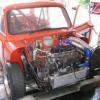I'm having a real problem with my car at the moment, with the first fuse going all the time. That's the 35amp fuse between loads 1 and 2 on the fuse box. I have a voltmeter but I'm not really sure what to do with it to find a short circuit (which is what must be causing the fuse to blow). Could someone give me a bit of advice for finding the fault with this particular part of the wiring please? A bit more info, the fuse blows as soon asthe ignition light comes on, without having to use the indicators, brake lights whatever. There are two white wires connected to the left side of the fuse (1) and two green wires (in one connector) on the right side of the fuse (2). One of the white wirees is going to the coil, not sure about the other. Both green wires go to a round box in the right hand side of the engine bay (a relay or something?)
Any help would be very much appreciated, as I can't drive my Mini without brake lights or indicators!
Thanks
edit - ive just had a better look and one of the green wires on the 2 side is going to the brake light switch, and only one is going to the round load on the right of the engine bay.
Edited by huw_jenks, 27 April 2010 - 03:48 PM.



















